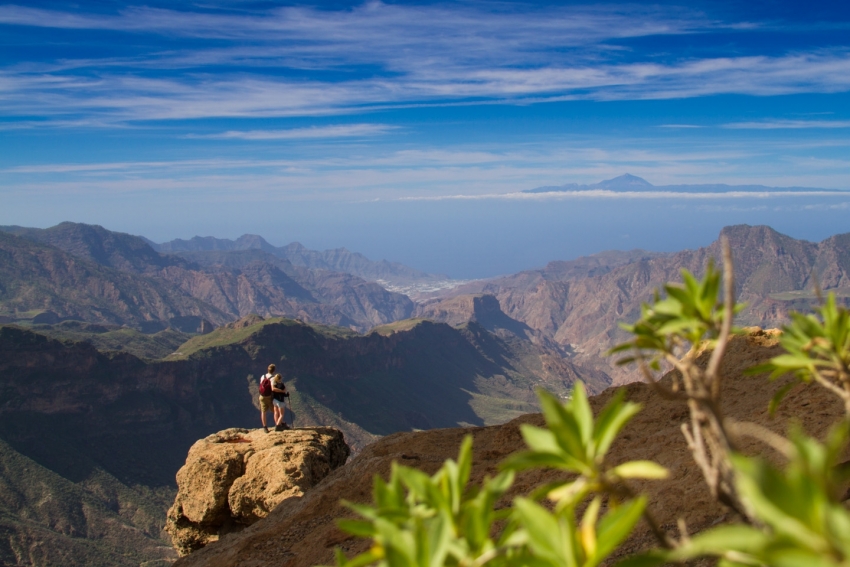While most people do a day trip to the highlands or visit the hill villages, they stick to the roads and all see the same things. As soon as you start walking, you see the island from new angles.
Walking also shows you the scale of the place. While it's only 60 km long and wide, Gran Canaria's is almost 2000 metres high and it's deep valleys mean that there's a lot more of it than you expect.
As we like to say, Gran Canaria is "a big place in a small space".
When to walk
Walking is great in Gran Canaria during the European winter, but you can walk in Gran Canaria all-year-round. The official walking season is from October to May; Perfect for walkers as most of their home trails are too muddy or frozen to be fun.
Alex Says: To see the island at its very best, walk in April and May when all the unique Canarian plants in the mountains are in flower and the whole island is green.
While Gran Canaria's mountains can be cold during the winter; they even get a dusting of snow every few years; walking is pleasant almost every day. Conditions vary from hot sunshine to cold mist within seconds so do bring decent walking gear. The great thing about Gran Canaria is that different areas have different climates so you can almost always find somewhere to walk in the sunshine, even in the middle of winter.
Lex says: We've lost count of the number of tourists we've seen in the cumbres shivering away in their flip-flops. Just because its hot on the beaches doesn't mean it will be as warm up the hill.
During the summer, it's best to focus on short walks and finish before the heat of the day starts. With a bit of planning, you can walk in the morning and spend the afternoon on the beach. We'd advise renting a car so that you can start walking at first light, or stay up in the hills at a rural hotel.
Please don't walk in the Gran Canaria highlands if there is a yellow or orange heat alert as the hot dry air dehydrates you in minutes and people walkers have died from heat exposure. Walking during and just after heavy rain is also risky as rockfalls are common and barrancos (ravines) can flood quickly.
Where to Walk
There's good walking all over Gran Canaria. Most people head up to the top and walk through the pine forests, but experienced walkers may prefer to explore the northern slopes and even the rugged west.
If you are a beginner, start with short circular walks to get used to the terrain and the temperatures. Try walking into the Bandama caldera or around its rim (one section is scary if you suffer from vertigo).
Lex says: Don't photograph the grumpy farmer at the bottom of the Caldera. He really doesn't like it, and nor does his donkey.
Another short walk is the popular hike up from La Goleta to Roque Nublo. This walk, which takles you through the pine forests and right up to the rock, takes about an hour there and back, longer if you drop down and loop below the rock.
Getting Around
This is often the big challenge for independent walkers in Gran Canaria. Many of the best walks start or end in places with no public transport so you have to be a bit creative. Local walkers often take two cars and leave on at each end of their chosen walk, but that's a bit tricky to organise if you're here on holiday.
Gran Canaria's blue buses are very reliable and have an extensive network. Get a timetable from a tourist information point or town hall anywhere on Gran Canaria. Even if the buses don't run to a town you can normally get a taxi from the closest bus stop. Be aware that siesta time is taken pretty seriously in the hills, especially in the summer. You may have to have a long lunch before the taxi driver wakes up.
Lex says: Gran Canaria is short on streams so carry plenty of water with you when you walk between towns.
Further Walking Information
Self-guided walkers should bring a good walking book, or use one of the local guide apps. We recommend Rambling Roger and the Gran Canaria Walking App.
For guided walking holidays in Gran Canaria














